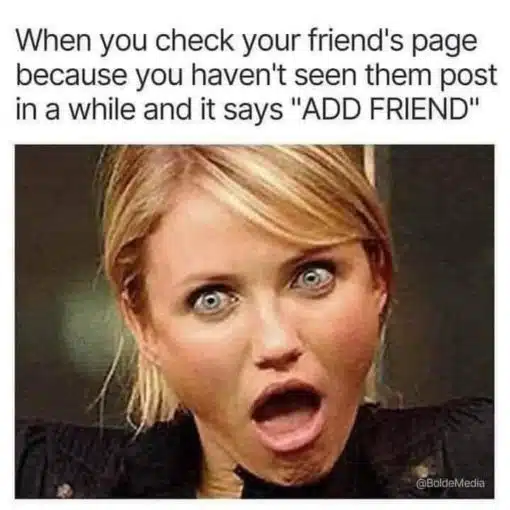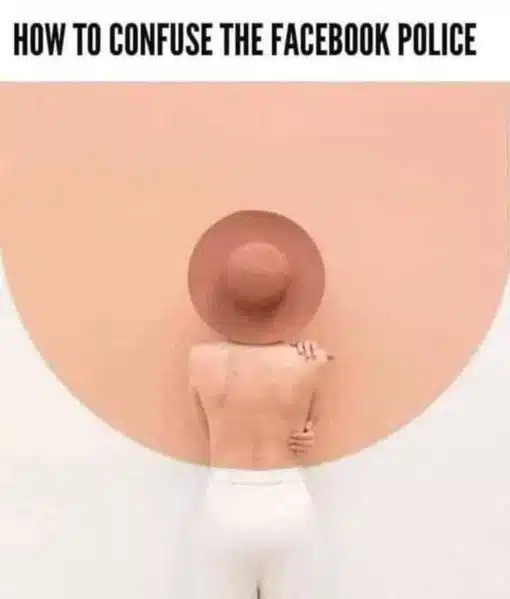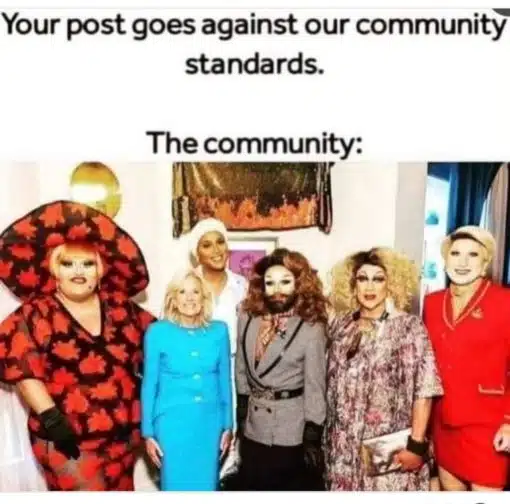Top 50 Facebook Jail Memes
RANKING FOR BEST Facebook Jail Meme
Welcome to “Facebook Jail Memes Ranked” on topyoular.com, your premier destination for all things hilariously punitive! As the self-appointed warden of laughs, I’m here to guide you through the cellblocks of humor with our carefully curated selection of the top 50 Facebook Jail memes. These aren’t your run-of-the-mill jests; these are the cream of the crop, the most uproarious, side-splitting captures of the Facebook Jail experience as voted by you, the internet-savvy public.
I take pride in showcasing the pinnacle of comedic genius revolving around the all-too-familiar virtual incarceration that is Facebook Jail. Whether you’re a seasoned inmate or a curious bystander, these memes are designed to elicit hearty laughs, knowing nods, and perhaps a bit of sympathy for those caught in the social media slammer. What makes this page truly special is its dynamic nature – the ranks are always shifting based on your votes, ensuring only the best memes wear the crown at any given time.
Each meme on “Facebook Jail Memes Ranked” is a testament to the creativity and wit of internet humorists everywhere. From clever quips about the absurdity of being banned for harmless jokes to poignant satire on the state of digital free speech, there’s a wide range of comedic takes to explore. By emphasizing the rank of these memes, I aim to not only entertain but also to celebrate the communal spirit of laughing together at our shared online follies.
Navigating through the top 50 Facebook Jail memes on topyoular.com is more than just a pass time; it’s a voyage through the ups and downs of social media life, a humorous reflection on what it means to be silenced, even if just momentarily, in the digital age. So, come join me on this journey, vote for your favorites, and help determine which meme deserves to be the top inmate in the funniest corner of Facebook Jail. Welcome, and enjoy your stay – laughter is guaranteed!
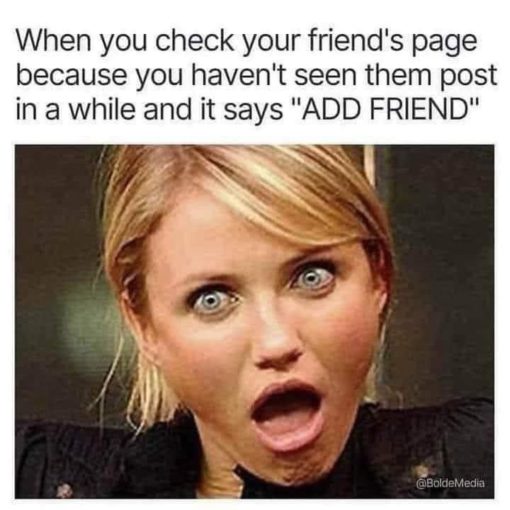
The image shows a woman with blonde hair, wide eyes, and an open mouth suggestive of shock or surprise. Her expression conveys a sense of bewilderment or incredulity, as if she has come across something entirely unexpected or baffling. The lighting and focus suggest that the image is a close-up shot, emphasizing the woman's facial expression and making it the focal point of the picture.
Overlaid on the image is a text that reads, "When you check your friend's page because you haven't seen them post in a while and it says 'ADD FRIEND.'" This caption adds context to the woman's expression, implying that the source of her shock is the discovery that she is no longer friends with someone on social media whom she thought was still a friend.
The image is humorous to some people because it captures a relatable modern-day scenario that plays out on social media platforms. People form connections online, and the unexpected removal or loss of a friend connection can come as a surprise, especially if there are no obvious reasons for such a change. The exaggerated facial expression may amplify the feeling of social bewilderment, adding to the comic effect.
This humor also taps into the social dynamics and etiquette of online friendships, where the act of unfriending someone can sometimes be perceived as a passive-aggressive or confrontational move. The image effectively captures the moment of realization that comes with such an online social faux pas, and many can relate to the confusion and feelings of hurt or curiosity that might follow.
Additionally, the humor can be derived from the over-the-top reaction to a relatively mundane online occurrence. The contrast between the woman's intense reaction and the simple act of no longer being 'friends' with someone on social media plays with the idea that people may overvalue these online connections, leading to comically exaggerated emotional responses to changes in online friend lists.
Lastly, the image serves as a form of social commentary, perhaps poking fun at the importance placed on online interactions and the silent interactions (like unfriending) that happen without direct communication. For some, the image might underscore how online connections, while meaningful, are also fragile and subject to misunderstandings or changes that can happen without warning or explanation, leading to amusing and unexpected situations like the one depicted in the meme. When you check your friend s page because you haven t seen them post in a while and it says ADD FRIEND BoldeMedia
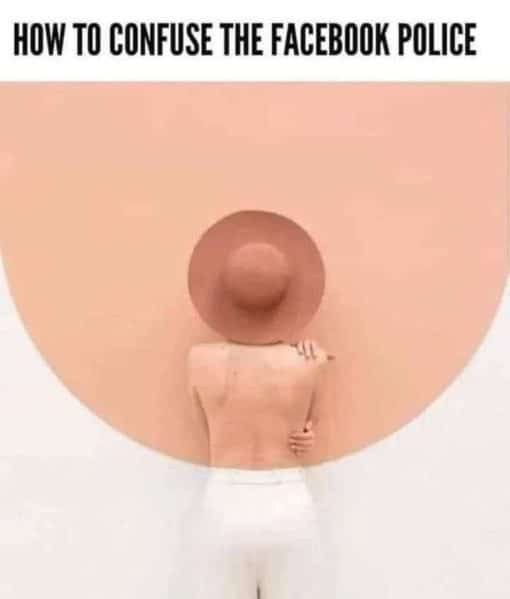
The image plays on expectations and censorship rules on social media platforms like Facebook, where nudity is often policed. The person in the image appears to be nude because of the positioning of a bald head (not belonging to them) near their back, mimicking buttocks, but in reality, they are not exposing any inappropriate body parts. The humor arises from the optical illusion and the commentary on platform moderation.

The image shows a person with their face superimposed onto the body of a character who appears to be restrained in an electric chair. The person is wearing a brown and tan shirt with what looks like a prisoner's number, and there is a metal headpiece attached to their head, suggesting an impending execution.
The text overlaid on the image reads, "WHEN FACEBOOK GETS TIRED OF PUTTING YOUR ASS IN FACEBOOK JAIL." This phrase references the notion of "Facebook Jail," which is a colloquial term used by social media users to describe being temporarily banned or having limited access to features on Facebook for violating the platform's community standards or guidelines.
The humor in the image is derived from the hyperbolic comparison between the relatively minor consequence of being put in Facebook Jail and the dramatic and severe punishment of being in an actual jail or, more specifically, sentenced to the electric chair. It exaggerates the reaction of Facebook to repeated violations, implying a comically extreme measure for repeat offenders.
People might find this image funny due to its satirical take on how social media platforms enforce their rules, and it plays on the frustration users might feel when they are penalized on the network. The joke also taps into the public discourse about social media moderation, freedom of speech, and the perceived authoritarian nature of the platforms' enforcement policies.
Additionally, the juxtaposition of an everyday scenario—someone being penalized on a social media website—with the gravitas of a life-or-death situation creates an absurdity that can be amusing. This sort of exaggeration is a common technique in humor to highlight the triviality of the original scenario.
Finally, the image's humorous effect is bolstered by the customization of the original movie scene, where the superimposed face of the person adds a personal touch, potentially making the meme relatable to individuals who have experienced similar sanctions on social media and can laugh about the frustration as a shared experience. WHEN FACEBOOK GETS TIRED OF PUTTING YOUR ASS IN FACEBOOK JAIL
WHEN FACEBOOK GETS TIRED OF PUTTING YOUR ASS IN FACEBOOK JAIL
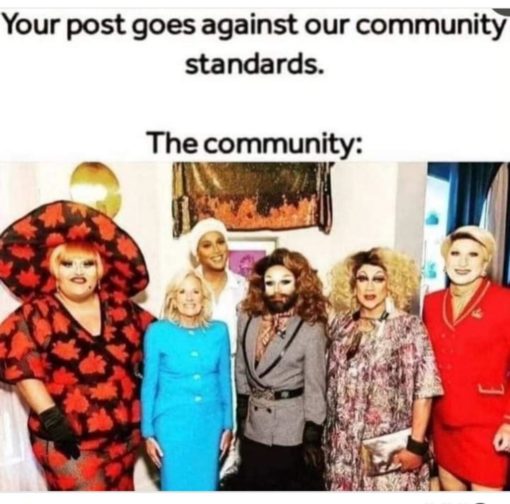
The image here is a humorous meme that plays on the juxtaposition between community standards and individual expression. At the top, bold text states, "Your post goes against our community standards." This is a common message on social media platforms when a post has been flagged or censored for violating predetermined rules.
Below this message, the text reads, "The community:" followed by a photo which is presumably meant to represent the community. In the photo, there are six individuals posing together, each with their own unique and flamboyant style, typically associated with drag queens. Their outfits are exaggerated and colorful, their makeup is bold and expressive, and their overall demeanor is one of confidence and flair.
This meme could be found funny because it subverts the expectation of what a community that enforces standards looks like. One might expect to see a homogeneous, conservative group but is instead presented with a vibrant and diverse set of characters. The irony is that the individuals in the picture are presenting themselves in a way that is generally considered non-conformist and potentially against the grain of "community standards," yet they are the ones representing the community in this context.
The amusement can also be found in the tension between conformity and nonconformity. The assertion is that your post does not fit within the accepted norm, yet the community members depicted are individuals who might regularly challenge societal norms with their appearances. It flips the script on what community approval entails and suggests a humorous critique of the arbitrary nature of some online community guidelines.
Furthermore, the image may be playing on the idea that those who might be most supportive of freedom of expression and identity could also be seen as a community capable of judging what is appropriate or not. It's a humorous play on the idea that even within communities that celebrate individuality, there are still rules to be followed — but it does so in a way that's exaggerated and playful.
Lastly, the meme is reflective of a larger conversation about freedom of speech versus community moderation on social media platforms. It satirizes the process of moderation by suggesting that those who decide what is acceptable are as varied and expressive as the content they are moderating. It's a light-hearted way to broach the debate on censorship and the subjective nature of what is deemed appropriate in online spaces. Your post goes against our community standards The community
Your post goes against our community standards The community
